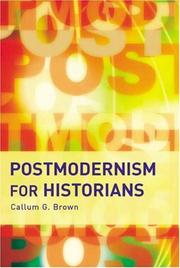Check nearby libraries
Buy this book

Postmodernism isn't some kind of optional plug-in for your world view. It is a powerful explanation of how ideas work. If you want to explore ideas with an informed perspective on how they function, you need to understand postmodernism. This primer by Callum G. Brown is an excellent starting point for anyone, not just historians and/or historiographers.
Brown begins by explaining "the two core principles of postmodernism": i) reality is ultimately unrepresentable; ii) therefore, there can be no authoritative account---of anything. This presents particularly strong challenges for the the study of history.
Brown then introduces the working concepts of signs, discourses, structures, the postmodern concept of a "text" (which entails more than letters and words), meta-narratives, and deconstruction. These include discussions of structuralism, post-structuralism, and post-colonial studies. Brown also provides enlightening examples of how these concepts are being used to interact with historical narratives and to reject the notion of historical authority in favor of a more nuanced understanding not of the past, but of the idea of the past. A final chapter summarizes some of the counter-criticisms to applying postmodern theory to history and historiography.
Brown provides numerous resources for additional reading at the end of each topical chapter and the writing is accessible throughout.
Participants in the Information Age would be well served to think more carefully and critically about contextualizing their relationship to information in a structured way. Every gadget, every widget, every post, every message exists within and contributes to discourses and meta-narratives whether you're aware of them or not.
Check nearby libraries
Buy this book

Previews available in: English
Subjects
History, Methodology, Philosophy, Postmodernism, Empiricism, Sign, Discourse, Poststructuralism, Text, Self, Morality, Criticism, History, philosophy, History, methodology, Historiography, Histoire, Méthodologie, PostmodernismePeople
Friedrich Wilhelm Nietzsche (1844-1900), Antonio Gramsci (1891-1937), Ferdinand de Saussure (1857-1913), Roland Barthes, Michel Foucault (1926-1984), Claude Lévi-Strauss, Jean Baudrillard (1929-2007), Edward Said, Jacques Derrida (1930-2004), Jean-Francois Lyotard, Giambattista Vico, Hayden White, Natalie Zemon Davis, Jacques Lacan (1901-1981)Places
France, United StatesTimes
1906-Present| Edition | Availability |
|---|---|
| 1 |
zzzz
|
| 2 |
aaaa
|
Book Details
Edition Notes
Includes bibliographical references (p. [190]-193) and index.
Classifications
The Physical Object
ID Numbers
Community Reviews (0)
Feedback?History
- Created April 1, 2008
- 14 revisions
Wikipedia citation
×CloseCopy and paste this code into your Wikipedia page. Need help?
| December 31, 2022 | Edited by MARC Bot | import existing book |
| December 16, 2022 | Edited by MARC Bot | import existing book |
| November 15, 2022 | Edited by ImportBot | import existing book |
| December 8, 2020 | Edited by MARC Bot | import existing book |
| April 1, 2008 | Created by an anonymous user | Imported from Scriblio MARC record |










